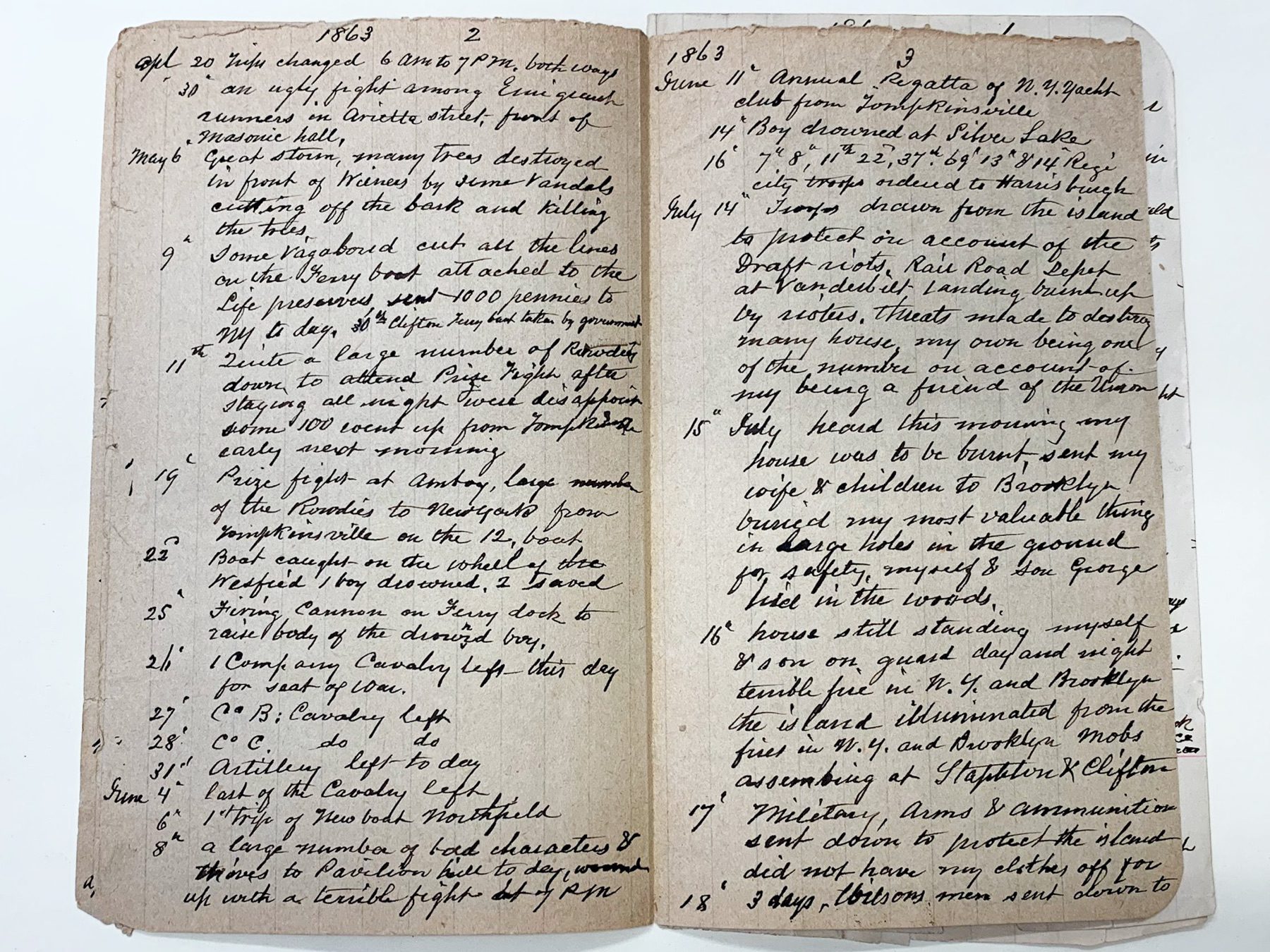
- This event has passed.
Podcast: Site Unseen – Draft Riots
Saturday, October 2, 2021
Site Unseen takes listeners into the Staten Island Museum’s collections to see how documents, photos, and objects illuminate local history. Audio shorts bring together present-day advocates, policymakers and historians, to retell, reveal, and amplify site-specific stories.
Episode 1: Draft Riots
In this episode public historian and policy analyst Debbie-Ann Paige will lead us on a harrowing journey along Staten Island’s north shore in the path of the Civil War Draft Riots which gripped New York City in July of 1863.
Debbie-Ann Paige’s research illuminates how the Civil War Draft Riots on Staten Island targeted historically Black neighborhoods and abolitionist enclaves on the North Shore. Using William Olliffe’s diary as a point of reference, Paige will explore the contemporary political and economic tensions between pro- and anti- slavery factions and Black and immigrant laborers that led to the Draft Riots in the mid-19th century on Staten Island.
The riots rose in response to Congress’ Conscription Act, which mandated the first wartime draft in US History. The law made men between the ages of 20 and 45 liable to go to war. However, a man could avoid the draft by paying a fee or hiring a substitute to fight in his place. The act did not apply to African American men who were not considered citizens. In New York, the white, mostly Irish and Irish-American working class, who could not afford to pay to avoid military service, felt the burden of the war fell unfairly on their shoulders. During the riots they took their anger out on the draft officials, the pro-war and anti-slavery press, white, often wealthy, abolitionists, and most viciously on Black New Yorkers, leaving death and destruction in their wake.
As you will hear, the Conscription Act provided the spark in a powder keg of existing economic and racial tension in New York City and throughout the entire war-torn nation. Throughout the episode, Debbie-Ann Paige weaves this overarching narrative in and out of the stories of Staten Islanders who were targeted by the rioters. Christopher Franz reads a firsthand account of the riots by William Olliffe who worked at the Tompkinsville ferry landing during the Civil War and kept a diary documenting his experiences. His diary is housed in the Museum’s collection.
*Note: This episode contains depictions of graphic violence. Listener discretion is advised.
Debbie-Ann Paige
Debbie-Ann Paige is a public historian specializing in local African American history, a co-president of the newly chartered Richard B. Dickenson Staten Island Chapter of the Afro-American Historical and Genealogical Society (AAHGS) and professional genealogist. She has worked on numerous local history projects including: In Pursuit of Freedom with the Brooklyn Historical Society; Women of the Nation Arise! and From Farm to City with the Staten Island Museum; and the designation of the Louis Napoleon House as a site to freedom with the National Park Service Underground Railroad Network on behalf of the Sandy Ground Historical Society.
Additionally, Debbie-Ann is a policy analyst with the Council of State Governments Eastern Regional Conference working with state policymakers on issues relevant to veterans’ affairs and staffs the organization’s new initiative Council on Communities of Color (CCC). She has also served as an advisor to the Daniel Society, Center for Law and Justice.
Christopher Franz
Christopher Franz is Chair of the Department of History & Social Sciences at Monsignor Farrell High School. Formerly the Political Editor for The Staten Island Register, he wrote extensively on local history, New York City and State government, and environmental issues.


